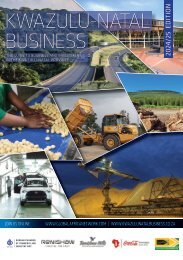Limpopo Business 2017-18 edition
A unique guide to business and investment in Limpopo. Limpopo Business 2017/18 is the ninth edition of this highly successful publication that has, since its launch in 2007, established itself as the premier business and investment guide to the Limpopo Province. This edition of Limpopo Business is officially endorsed by the Office of the Premier of Limpopo. This book contains detailed insights into the plans of the Limpopo Economic Development Agency (LEDA) and the recently launched bus rapid transport system for the provincial capital, Leeto la Polokwane, together with a comprehensive register of all provincial government and municipal contact details. Investment news related to mining, telecommunications and tourism is carried in overviews of all the main economic sectors. To complement the extensive distribution of the print edition of the magazine, the publication is also available online at www.limpopobusiness.co.za.
A unique guide to business and investment in Limpopo.
Limpopo Business 2017/18 is the ninth edition of this highly successful publication that has, since its launch in 2007, established itself as the premier business and investment guide to the Limpopo Province. This edition of Limpopo Business is officially endorsed by the Office of the Premier of Limpopo.
This book contains detailed insights into the plans of the Limpopo Economic Development Agency (LEDA) and the recently launched bus rapid transport system for the provincial capital, Leeto la Polokwane, together with a comprehensive register of all provincial government and municipal contact details. Investment news related to mining, telecommunications and tourism is carried in overviews of all the main economic sectors.
To complement the extensive distribution of the print edition of the magazine, the publication is also available online at www.limpopobusiness.co.za.
Create successful ePaper yourself
Turn your PDF publications into a flip-book with our unique Google optimized e-Paper software.
FOCUS<br />
Ramosobane cites aspects such as digitalisation, robotics, 3D printing,<br />
green solutions and big data as elements of the new economy that<br />
are driven through ICT. As a consequence, one of the key objectives<br />
of <strong>Limpopo</strong> Connexion is the development of broadband telecommunication<br />
infrastructure for the province.<br />
Planners are looking beyond the ICT sector in isolation. As<br />
Ramosobane notes, “There have to be ways of using technology in<br />
different sectors of the economy, because ICT is all pervasive. Whether<br />
it’s finance, whether it’s roads, or it's construction or mining, ICT and<br />
technology will be used in those sectors.”<br />
With <strong>Limpopo</strong>’s great strength as a resource-based economy, what are<br />
the ways that ICT can further develop the mining and agricultural sectors?<br />
Miners can cut costs enormously if they use up-to-date data- collection<br />
methods rather than traditional methods. Data-driven research can<br />
help to make sure that communities benefit to a greater degree when<br />
beneficiation of minerals or agricultural produce takes place.<br />
And Ramosobane believes that there is great potential beyond<br />
the resource economy: “When you talk about tourism, how do we sell<br />
<strong>Limpopo</strong> globally without actually going there, but using innovation<br />
systems and technology?”<br />
Strategic objectives<br />
Open access broadband telecommunications network infrastructure:<br />
Government, business, rural communities, students and citizens<br />
at large should all be able to access affordable broadband infrastructure<br />
services. This initiative should empower community members to<br />
participate in the mainstream economy. Says Ramosobane, "Any person<br />
in the province, be it plumbers, be it students at the universities,<br />
learners and educators at high schools, ordinary people, households;<br />
they should all be able to have access to the affordable broadband<br />
infrastructure services and cheaper technologies."<br />
A science and technology park (STP): An STP is a space, physical or<br />
cyberspatial, managed by a specialised professional team that provides<br />
value-added services, whose aim is to increase the competitiveness<br />
of its region or territory of influence by stimulating a culture of quality<br />
and innovation among its associated businesses and knowledge-based<br />
institutions, organising the transfer of knowledge and technology from<br />
its sources to companies and to the marketplace, and by actively fostering<br />
the creation of new and sustainable innovation-based companies<br />
through incubation and spin-off processes. It must attract international<br />
ICT companies to the province where they can interact and partner with<br />
academic institutions and local businesses. The international companies<br />
can originate (and pay for) research projects that are directly<br />
relevant to the work they are doing, rather than doing research for<br />
research’s sake. Provide direct links between the private sector, government<br />
and universities.<br />
Free and open source software<br />
(FOSS): Providing free<br />
and open source software<br />
to the citizens of <strong>Limpopo</strong><br />
cuts the cost of ICT, thus enabling<br />
small businesses to gain access to<br />
the advantages of the Knowledge<br />
Economy without having to pay<br />
high prices for licensed software<br />
packages.<br />
A provincial FOSS strategy<br />
has been adopted and<br />
several pilot programmes<br />
rolled out.<br />
These programms include<br />
systems such as a Wildlife Trade<br />
Permit System, Tourism Guide<br />
Registration Systems, a Consumer<br />
Affairs System, a Farmer’s Portal<br />
and Mobile Application, and an<br />
eHeritage Database and Portal<br />
among others.<br />
<strong>Limpopo</strong> Connexion, in partnership<br />
with Tirelo Bosha-Public<br />
Service Improvement Facility, a<br />
bilateral programme between<br />
Belgium and South Africa<br />
facilitated by the Department of<br />
Public Service and Administration<br />
(DPSA), has implemented an open<br />
source-based offline content<br />
project in 15 schools previously<br />
without Internet connectivity.<br />
With feedback from the <strong>Limpopo</strong><br />
Department of Education and<br />
principals from schools, the project<br />
will be expanded by a further<br />
grant from the Belgium government<br />
to 45 more schools in the<br />
Province. There was significant<br />
improvement in the matric results<br />
due to the introduction of<br />
the system.<br />
Training in FOSS is being undertaken<br />
in partnership with<br />
SUSE, a large international open<br />
source software company.<br />
LIMPOPO BUSINESS <strong>2017</strong>/<strong>18</strong><br />
32


















